During the recently concluded session of the Minnesota Legislature, Land Stewardship Project members and partners worked to win record investments in sustainable and regenerative agriculture, small and mid-sized farmers, and rural communities after decades of underfunding. We won a MinnesotaCare Public Option, as well as historic investments in the Emerging Farmers Office at the Minnesota Department of Agriculture (MDA), a Meat Processing Liaison, Climate Coordinator, and Farm-to-Institution Coordinator positions at the MDA, and more.
We entered this legislative session with a clear vision, leaders prepared to make their voices heard, and favorable dynamics — a $17 billion surplus and Committee Chairs who share our values of stewardship, justice, democracy, health, and community. This past fall, hundreds of LSP members worked together to develop the Minnesota Food & Farm Campaign with seven focus areas — an initial roadmap to how we will make our holistic vision for people and the land a reality through state policy. People power made these wins possible. Here are some highlights:
– We held the largest Family Farm Breakfast & Lobby Day in LSP history with more than 300 people, many of whom were
recruited by 30+ LSP members who were “Neighborhood Leaders,” many of whom held prep meetings in their community and brought new people to LSP.
– We held four powerful Town Hall meetings featuring 250 people, including small and emerging farmers, farmers’ market managers, and rural leaders. During this meetings, people had the opportunity to ask questions of Minnesota Attorney General Keith Ellison, House Agriculture Committee chair Samantha Vang, Senate Agriculture Committee chair Aric Putnam, House Agriculture Committee vice chair Kristi Pursell, Senate Agriculture Committee vice chair Rob Kupec, and Jason Garms of the Minnesota Department of Natural Resources (DNR).
– Twenty-five LSP farmers, processors, and rural leaders shared their stories in legislative hearings in support of our priorities for people and the land.
– Three hundred and four farmers, processors, and marketers signed our letter calling for robust investments in emerging and small-scale farmers, local meat processing, local food systems programming and infrastructure, and soil health.
– Over 1,100 LSP members and supporters engaged in our legislative organizing during this session by attending events, signing petitions, and contacting their legislators and the Governor over 2,500 times.
– LSP deepened our partnership with the Minnesota Farmers’ Market Association, Climate Land Leaders, The Good Acre, Institute for Agriculture and Trade Policy (IATP), Midwest Farmers of Color Collective, CURE (Clean Up the River Environment), Greener Pastures, the Latino Economic Development Center (LEDC), and The Food Group by pushing bills forward together and co-hosting the LSP Family Farm Breakfast, as well as a virtual town hall with the Agriculture Committee chairs.
– LSP attended the signing of the Omnibus Agriculture, Broadband, and Rural Development bill at Medicine Creek Farm, which is owned and operated by Hannah Bernhardt, a farmer-leader with LSP, the Minnesota Farmers Union, Climate Land Leaders, and the Emerging Farmers Working Group.
Keep reading to learn what we won (and didn’t) in each focus area of the Minnesota Food & Farm Campaign.
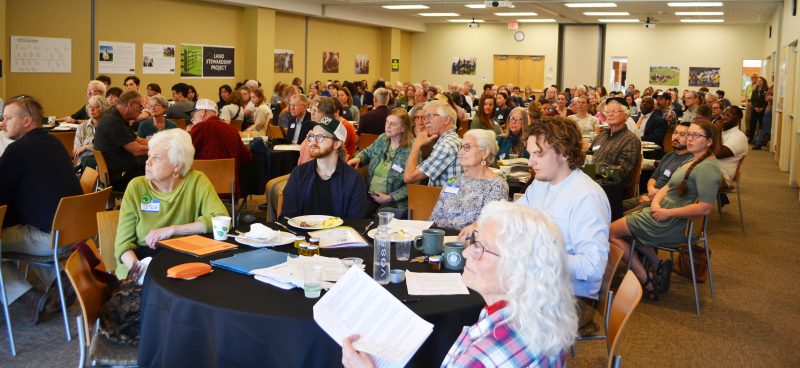
Focus Area 1: Steward Healthy Soil, Clean Water, a Resilient Climate & a Thriving Pollinator Population
We Won…
Farmer Incentives and Agency Support for Soil Health
→ The establishment of a fulltime Climate Coordinator Position within the Minnesota Department of Agriculture (MDA) to implement the State’s Climate Action Framework, leverage federal funding, and coordinate across state agencies and partners.
→ $1.46 million per year for Soil and Water Conservation Districts (SWCDs), and $203,000 per year for the Board of Water and Soil Resources (BWSR) for soil health practices cost-sharing.
→ $16.596 million per year for BWSR for soil health cost-sharing, including the establishment of a Soil Health Practices Program to provide financial and technical assistance to farmers, SWCDs, and private sector organizations to establish soil health practices with climate and water quality benefits.
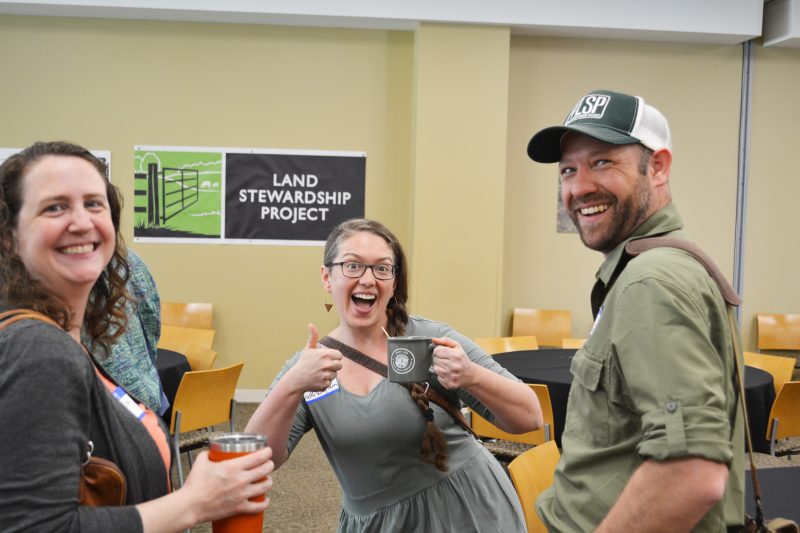
→ $625,000 per year for the MDA Soil Health Financial Assistance Program, which focuses on soil health equipment purchasing and cost share.
→ $3.5 million per year for the MDA Ag Water Quality Certification Program to enroll more farms in the program, support technical assistance, and increase soil health acreage in the state.
→ $1.75 million per year for conservation equipment grants for farmers to purchase new or retrofit existing agricultural equipment needed for practices that provide climate and water quality benefits.
→ $3 million to provide incentives to enrollees of the Conservation Reserve Program (CRP) during the continuous enrollment period and to enroll complementary areas in conservation easements.
→ $250,000 per year for the Continuous Living Cover Supply Chain Development Grant Program for organizations and businesses to develop supply chains, processing, and markets for continuous living cover crops.
→ $25.577 million per year for FY 2024-25 for Soil & Water Conservation Districts from the Environment & Natural Resources budget and the Taxes budget.
→ $3.802 million per year for the Forever Green Initiative to develop continuous living cover cropping systems, including markets and processing.
Clean Energy Wins
→ After years of organizing, we won a transition to 100% Clean Energy by 2040.
Pollinator Focused
→ A ban on PFAS and PFOS in pesticides by 2032. PFAS and PFOS are human made “forever” chemicals that are detrimental to human health. Although this ban is not soon enough, this is major progress in protecting farmers from harmful substances.
→ $175,000 for the Minnesota Pollution Control Agency (MPCA) to develop a plan for the safe disposal of treated seed waste.
→ Restricting use, storage, handling, distribution, or disposal of seed treated with a pesticide in a manner that endangers humans, food, livestock, fish, or wildlife, or will cause unreasonable adverse effects on the environment.
→ A prohibition on disposing waste treated seed in a manner inconsistent with the product label or by a drinking water source, a surface water feature, composting, or incinerating within a home or other dwelling.
→ A prohibition on the use or sale of neonicotinoid-treated seed as food, feed, oil, or ethanol feedstock.
→ Restoration of local control over pesticide-lethal pesticides, allowing cities to adopt and enforce ordinances to limit or ban pesticide use. This will not impact farms unless they are within the limits of a city that adopts such an ordinance.
→ A measure to ensure Minnesotans can plant native landscapes on private land without interference from cities.
→ Highways for Habitat, a proposal to alter the Minnesota Department of Transportation’s (MnDOT) management of ditches to significantly increase critical roadside habitat for pollinators, birds and wildlife. MnDOT will receive guidance from the Board of Water and Soil Resources on native vegetation, avoid the use of insecticides lethal to pollinators, and protect nesting birds, pollinators, and other wildlife in its ditch management.
→ $2 million per year for the Lawns to Legumes program.
→ $800,000 for the Pollinator Research Account.
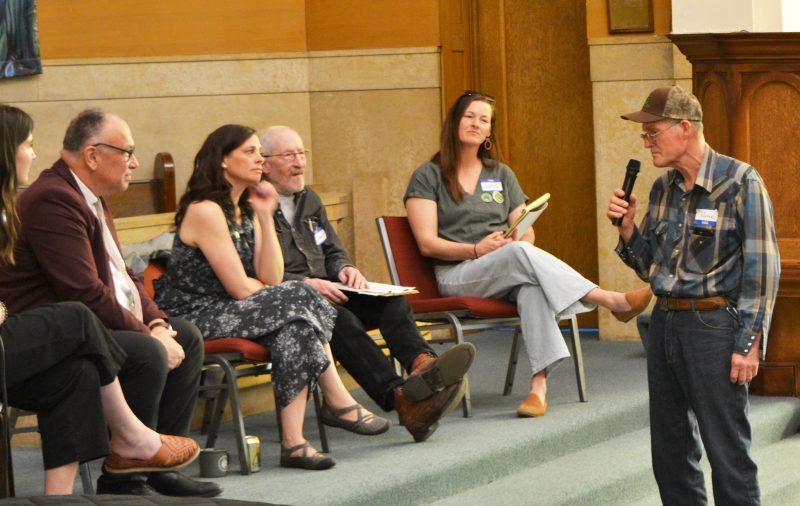
Focus Area 2: Create Strong Regional Food Systems, Including Planning, Programming & Infrastructure
We Won…
→ A full time Farm-to-Institution Coordinator at the MDA to support the Farm-to-School Grant Program and expand market access for growers in Minnesota.
→ $1 million per year for the Farm-to-School initiative and, due to a policy change this session, Early Childhood Education Centers to reimburse schools for purchases from Minnesota farmers and the infrastructure they need to process and serve such foods — an increase from $800,000 per year.
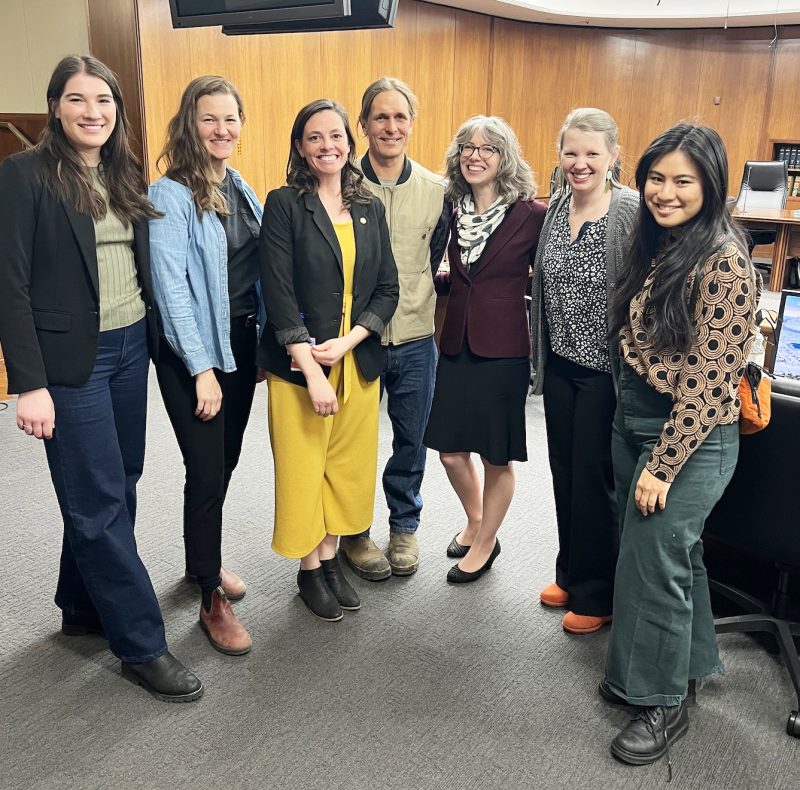
→ $100,000 per year for SNAP and EBT infrastructure at farmers’ markets and food hubs across the state.
→ $300,000 per year for The Good Acre’s LEAFF Program, which purchases produce from emerging farmers to supply food shelves and hunger relief organizations free of charge.
→ $2 million per year for the Urban and Youth Agriculture Grant Program to promote urban youth agricultural education and urban agriculture community development in communities with more than 5,000 people.
→ $1 million per year for the Good Food Access Program to provide grants to small-scale grocers to scale up affordable, nutritious, and culturally appropriate foods, including fruits and vegetables, for underserved communities in low- and moderate-income areas.
→ $200,000 per year for grants to finance new cooperatives for processing, marketing, or agricultural services.
→ $186,000 per year for the Minnesota Grown Program to support promotion of Minnesota grown products.
→ A Meat & Poultry Processing Liaison position in the MDA. Originally crafted with input from a group of LSP processor and livestock farmer-members in 2021-22, this bipartisan initiative made it across the finish line this year with support from the Minnesota Farmers Union (MFU), Minnesota Farm Bureau, Minnesota Association of Meat Processors, and others.
→ $544,000 for small meat processor training and employee retention grants. This proposal, championed by MFU (and supported by LSP), provides organizations with funding to support processors in their efforts to recruit, train, and retain employees.
→ $1.25 million per year for the popular AGRI Meat, Poultry, Egg, and Dairy Processing Grant program. This grant program is instrumental in supporting small and mid-sized processors across the state and has a huge impact in supporting the development of regional food systems.
→ Universal Free School Meals, which aims to ensure no child goes hungry at school regardless of socioeconomic status or zip code. The Minnesota for Hunger-Free Schools Campaign, endorsed by LSP, was driven by Hunger Solutions.
→ $1 million for the Healthy Eating Here at Home Program, which assists low-income Minnesotans in purchasing healthy, nutritious food. These dollars were formerly restricted to purchases at farmers’ markets (“Market Bucks”), but are now eligible to be used in Community Supported Agriculture (CSA) and direct farm purchases due to a policy change included in the bill. This effort was also championed by Hunger Solutions.
→ $850,000 per year for food banks to purchase local food and redistribute it to families facing food insecurity.
Focus Area 3: Greatly Increase Access to Land & Resources for Emerging, Beginning & Aspiring Farmers
We Won…
→ Historic funding for the Emerging Farmers Office: $750,000 per year for fiscal year 2024-2025, and $1 million per year thereafter. With the Emerging Farmers Office currently having only one fulltime staff member, these dollars are critical to scale up staffing and services to ensure emerging farmers have consistent and ample institutional support.
→ Increased funding for the Down Payment Assistance Program: $1 million per year for fiscal year 2024-2025. We also won a statutory change to require a 30-day application period. During the first application period, the MDA closed the application after less than a day and awarded grants on a first-come first-serve basis. Although this truncated application period was due to demand being much higher than the dollars available, this was not an accessible or equitable approach, especially for those who have poor broadband, have competing responsibilities, or do not speak English as their first language.
→ A repeal of the sunsetting of the Emerging Farmers Working Group.
→ $275,000 for fiscal year 2024 for grants to organizations that provide technical assistance and other services to emerging farmers.
→ Renewing the Beginning Farmer Tax Credit through 2031 with $6.5 million per year for fiscal year 2024-2025 and $4 million per year thereafter. To further incentivize the sale of land and assets to beginning farmers, rather than just rentals, the tax credit rate was raised from 5% to 8% with the maximum credit increasing from $32,000 to $50,000. In addition, the tax credit rate will be 12%, rather than 8%, when land or assets are sold to an emerging farmer. State law defines an emerging farmer as a farmer or aspiring farmer who is a woman, veteran, person with disabilities, American Indian or Alaskan Native, member of a community of color, young, or urban, or any other emerging farmers as determined by the MDA Commissioner. Half of the funds will be set aside for emerging farmers between January 1 and September 30 of each year. On October 1 of each year, any unused funds that were set aside for emerging farmers will be available to any otherwise qualified applicant. The Minnesota Farmers Union led this effort with LSP’s support.
→ $6.5 million for the East Phillips Neighborhood Institute (EPNI) to assist with the cost of purchasing the former “Roof Depot” site to build an indoor urban farm. For years, south Minneapolis residents, primarily Indigenous residents, have led a fight to transform the former “Roof Depot” site into an indoor urban farm. However, the City of Minneapolis has been a major barrier, pushing for this site to be used for public works and water utilities. The city finally agreed to sell the site to the community for $17 million. With the state’s investment, EPNI needs to raise an additional $3.7 million by September to finalize the purchase.
→ $5 million to transfer ownership of land within the Upper Sioux State Park to the Upper Sioux Community. The bill directs the Department of Natural Resources to transfer ownership of state-owned land and real property within the park upon approval by the Minnesota Historical Society’s Executive Council. If they run into legal or financial barriers, the DNR and Historical Society must identify them and make recommendations to the Legislature for how to address and eliminate barriers by January 15, 2024. This effort was championed by the Upper Sioux Community. LSP wrote a letter of support and LSP members participated in a public meeting about the land transfer.
Focus Area 4: Protect Rural Communities & Small & Mid-sized Livestock Farmers from Factory Farming
On Water Quality, We Won…
→ Comprehensive changes to fish kill investigations. Following a major fish kill in July 2022 that left over 2,500 fish dead in southeastern Minnesota’s Rush Creek, LSP members in Winona County organized around attempting to identify the cause. But they faced challenges from the Minnesota Pollution Control Agency (MPCA) and the DNR. It took nine months to learn what the cause was — improper manure management on a large-scale feedlot prior to a heavy rain event. In February, LSP members began working with Rep. Sydney Jordan (DFL – Minneapolis) and Sen. Jen McEwen (DFL – Duluth) on a bill they introduced to strengthen fish kill investigations. We worked on this issue with Minnesota Trout Unlimited, the Minnesota Well Owners Organization, and the Minnesota Center for Environmental Advocacy. The language we collectively wrote, testified on, and passed will strengthen fish kill investigations and create a path to prevent future fish kills by:
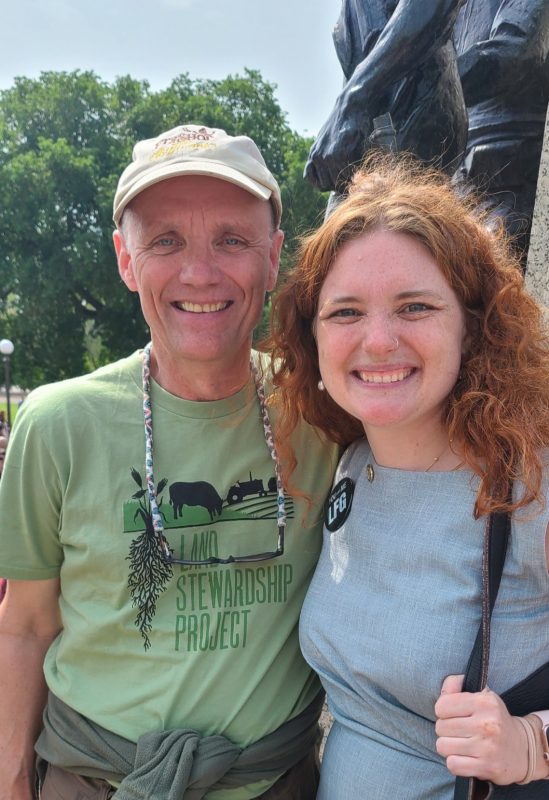
– Directing the MPCA, DNR, MDA, and Minnesota Department of Health (MDH) to propose and finalize a comprehensive investigation protocol, with a public comment period on the proposal.
– Involving the MDH, which is the state authority for drinking water. When hundreds or thousands of fish are killed in a stream that provides people’s drinking water, it’s not just an environmental issue, but a public health issue.
– Requiring an on-the-ground response from the state within 24 to 48 hours, as well as a more comprehensive list of what samples to collect and what tests to run. To receive accurate data, especially within a flowing water system, a quick and thorough response is imperative.
– Strengthening public notices to downstream residents when a fish kill occurs.
– Publishing fish kill occurrences and fish kill investigation reports in the Environmental Quality Board (EQB) Monitor.
– Directing the MDA, MDH, MPCA, and DNR to make recommendations to the Legislature on what laws and regulations need to change to prevent future fish kills from occurring, particularly in the karst region of southeastern Minnesota.
– Millions of dollars for private well testing and water quality monitoring, including some earmarked for monitoring nitrates and pesticides in drinking water.
– A $200,000 grant for the University of Minnesota Water Council to develop a timeline and budget for a plan to promote clean water in Minnesota for the next 50 years.
– A measure directing state agencies to implement Water Restoration and Protection Strategies to ensure all waters in Minnesota reach a healthy status by 2050.
On Environmental Review & Permitting, We Won…
→ The Frontline Communities Protection Act, also known as the Cumulative Impacts Bill. This bill, championed by environmental justice leaders, requires state regulators to consider existing pollution levels in an area before approving or renewing a permit in or adjacent to an environmental justice community. An environmental justice community is defined as a census tract in which “(i) 40 percent or more of the population is nonwhite; (ii) 35 percent or more of the households have an income at or below 200 percent of the federal poverty level; or (iii) 40 percent or more of the population over the age of five has limited English proficiency; or [is] (2) located within Indian Country.” Unfortunately, corporate polluters were successful in limiting the scope of the bill to the seven-county metro, Duluth, and Rochester. This means that cumulative impacts analysis is unlikely to apply to factory farm proposals.
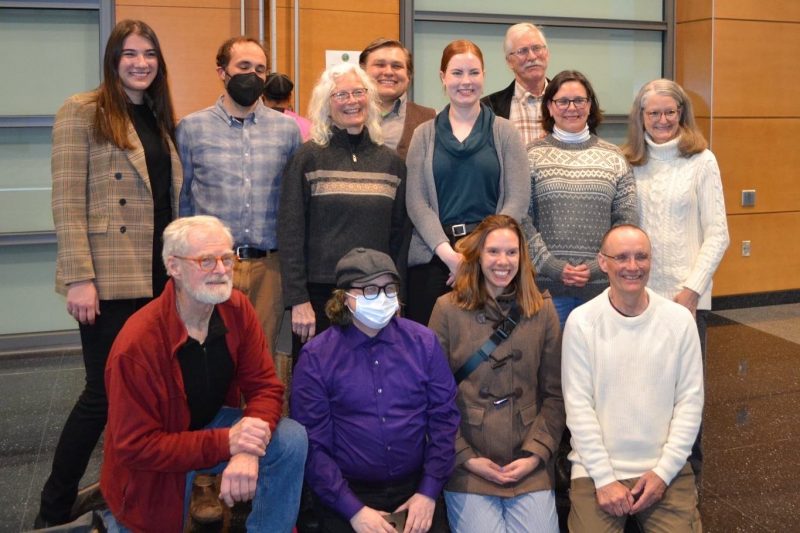
LSP members and allies worked hard to advance a bill this legislative session that would reinstate community oversight of the Minnesota Pollution Control Agency (MPCA) by re-establishing the Citizens’ Board, renamed the Community Board. Unfortunately, we were not successful due to opposition from corporate agriculture and mining interests, as well as a lack of support from the MPCA and Governor Tim Walz. Because of the opposition of corporate interests, Reps. Jeff Brand (DFL – St. Peter), Luke Frederick (DFL – Mankato), Dave Lislegard (DFL – Aurora), and Gene Pelowski (DFL – Winona) successfully killed the bill. That being said, we made significant progress on this proposal and are not done fighting for an MPCA that puts people and our environment before corporate polluters’ profits. Here’s what we accomplished with this proposed legislation:
- LSP and allies collaborated to build new measures into the proposed legislation to prevent the Board from being captured by corporate interests and to ensure those who are the most impacted by corporate polluters are front and center.
- The bill was championed in the House by a rural legislator, Rep. Kristi Pursell (DFL – Northfield), with 23 co-authors on the bill.
- The bill was led in the Senate by the chair of the Environment, Climate, and Legacy Committee, Sen. Foung Hawj (DFL – St. Paul). We had three powerful co-authors: State and Local Government Committee chair Erin Murphy (DFL – Saint Paul), Agriculture and Rural Development Committee chair Aric Putnam (DFL – Saint Cloud), and Finance Committee chair John Marty (DFL – Roseville). In the Senate, bills are limited to five authors total.
- The bill was heard in and passed out of a Minnesota Senate committee for the first time since the Board was abolished in 2015. There were five testifiers in support of the bill, all of whom were from Greater Minnesota. Three were farmers, one was a member of the MPCA Citizens’ Board when it was abolished, and one was an Indigenous leader.
- The bill was heard in the Minnesota House and was included in the Environment and Natural Resources Omnibus Bill.
- Approximately 150 people who attended our Family Farm Breakfast and Lobby Day on April 13 spoke to approximately 90 legislators about the issue to secure legislators’ support.
Focus Area 5: Build a Fair, Economically Just Farm Economy
We Won…
→ A voluntary Grain Indemnity Fund with a $10 million investment. This new fund, championed by the Minnesota Farmers Union, will help protect grain farmers when they lose out on payments due to fraud, elevator collapse, or other events that cause non-payment to producers.
→ Full funding for the Attorney General’s Office.
→ $4 million per year for the Dairy Assistance, Investment, and Relief Initiative (DAIRI), which provides grants to small-scale dairy farmers enrolled in the federal Dairy Margin Coverage Program to help them stay in business. This was championed by Minnesota Milk.
→ $337,000 per year for the Farm Advocates initiative, which provides services to farmers in financial stress, with some funding set aside for farmland transitions programs.
Although a version of Right to Repair did pass this legislative session, agricultural equipment was exempted. We believe farmers deserve the right to repair the equipment they own — and the original bill provided this right. It required manufacturers, such as John Deere, to provide product owners and independent repair businesses with fair access to service information and affordable replacement parts. If our allies at the Minnesota Farmers Union and beyond push to repeal the exemption for agricultural equipment in future legislative sessions, LSP will be actively supportive.
Focus Area 6: Build Healthy, Robust Rural Communities
We Won…
→ The MinnesotaCare Public Option — allowing Minnesotans, regardless of income level or immigration status, to purchase a MinnesotaCare plan if they choose to, starting January 1, 2027.
→ A Prescription Drug Affordability Board and a related advisory council to carefully review the cost of prescription drugs and set upper payment limits for drugs when the cost creates an affordability challenge to the state health care system or patients.
→ A prohibition of health care transactions, such as mergers, that “substantially lessen competition or tend to create a monopoly.” This could, for example, prevent the proposed Sanford – Fairview merger.
→ The creation of a publicly administered Paid Family & Medical Leave insurance program, where everyone contributes and everyone benefits, including self-employed Minnesotans like farmers.
→ An Earned Safe & Sick Time standard to ensure all working Minnesotans earn a benefit where, for every 30 hours worked, they are eligible for one hour of paid time off — up to 48 hours over the course of the year.
→ $125 million for the Border-to-Border Broadband Fund, $40 million of which is earmarked for the Lower Population Density Grant Program.
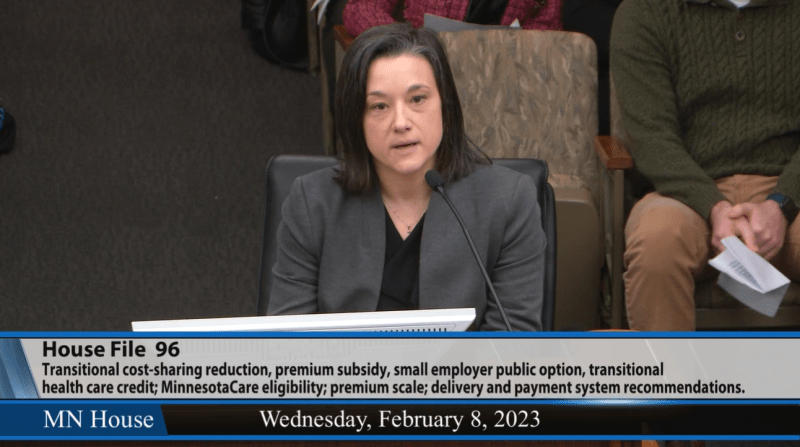
Focus Area 7: Care for Farm & Food System Workers
We Won…
→ The Safe Workplaces for Meat & Poultry Processing Workers Act, which establishes basic protections for workers in meat and poultry processing facilities with more than 100 full-time equivalent employees. This was championed by the United Food & Commercial Workers Union, Local 663.
→ The inclusion of farmworkers in Paid Family & Medical Leave.
→ The inclusion of non-citizen Minnesotans, including undocumented immigrants, in the MinnesotaCare Public Option. All Minnesotans deserve the affordable care they need when and where they need it, regardless of immigration status. Our communities are healthier when we’re all covered.
→ The restoration of Drivers Licenses for All. This makes it possible for all eligible Minnesotans, regardless of immigration status, to obtain a drivers license in Minnesota.
In addition, the Land Stewardship Project supported the We Choose Us Campaign that championed various proposals to strengthen our democracy and improve access to the ballot box. Here’s what this campaign accomplished:
→ Expanding voter rights and voting access with automatic voter registration, restoring the right to vote for Minnesotans on parole or probation, allowing 16- and 17-year olds to pre-register to vote, and a permanent absentee voting list.
→ Making the ballot box more accessible by extending early voting hours, guaranteeing workers the right to time off to vote early, facilitating voting for people living in assisted living facilities, strengthening physical accessibility at polling locations, and requiring voting material in multiple languages, as well as multilingual election judges.
→ Addressing money in politics with increased transparency and prohibiting foreign-influenced corporations from spending money on our elections.
→ Strengthening election administration with a statewide ban on intimidation and harassment of election workers and voters and the creation of a robust system for online voter registration.
During the 2023 session of the Minnesota Legislature, together we made tangible progress toward building a farm and food system that is truly sustainable and just for farmers, workers, and consumers as we collectively face climate change, consolidation, and the hollowing out of rural communities. Organizing works — and that’s what we’ll continue to do to ensure these wins are successfully implemented, prepare for the 2024 legislative session, and win a transformational 2023 Federal Farm Bill. Stay tuned for more organizing opportunities, as well as opportunities to secure dollars from these programs for your farm, school, and/or community.
Please join LSP as a member, renew your membership, or make a special gift to support our policy and programmatic work. LSP is only as strong as our membership, and each of us plays a part in creating the food and farm system we want and need. Consider joining LSP as a member, renewing your membership, or making a special gift today with a tax-deductible contribution of any amount that’s meaningful to you. In addition, please consider sharing this blog with your legislators, your neighbors, your family, your friends, your social media networks, people in your community, your cows — it takes all of us!
LSP organizer Laura Schreiber can be reached at lschreiber@landstewardshipproject.org; LSP policy manager Amanda Koehler is at akoehler@landstewardshipproject.org.